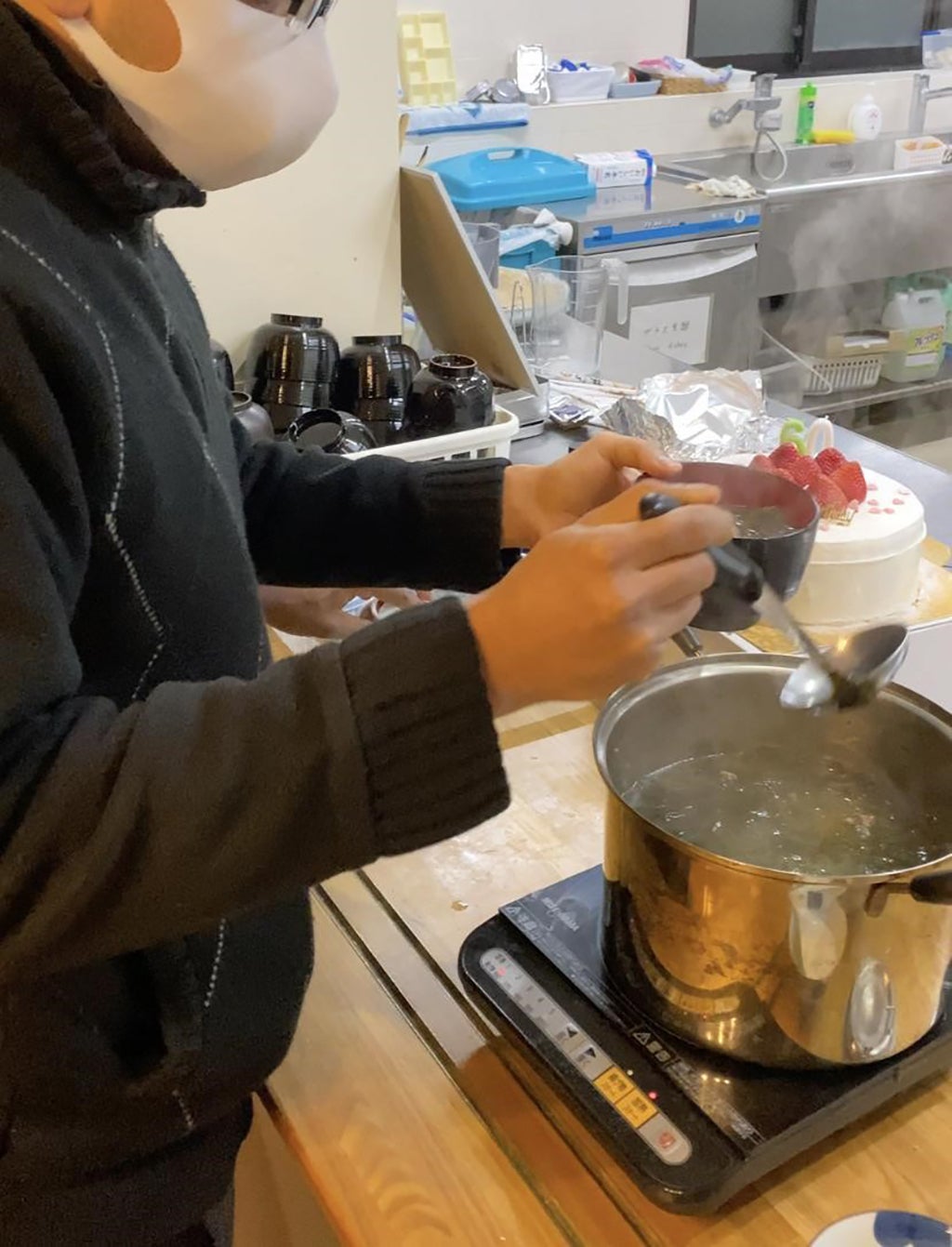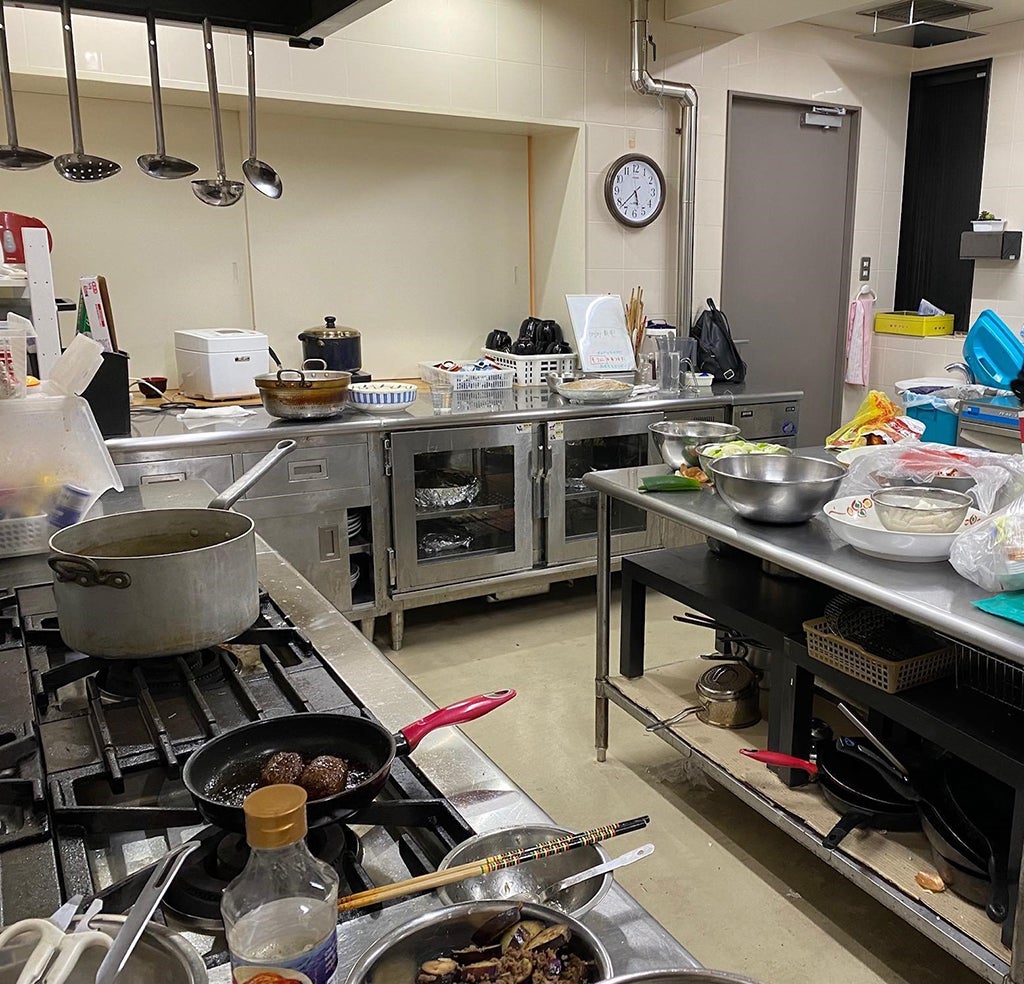Pandemic Cooking and Community: Home Among Foreign-born Jesuits in Japan
contributed by Allen J. Kim, 8 June 2022

Dining with residents and visitors. 01/05/2022. Japan. Photo by author
The closing of food courts and restaurants worldwide during the pandemic, coincided with the increased domestic practices of home cooking and eating, with increased reliance on food delivery services. This was no different for religious communities who were confined at home and forced to innovate their ministry, but also the domestic activities for their members. The Roman Catholic Church in Japan comprises only 0.3 percent of the total population. For a small group of “scholastic” seminarians in the Jesuit Catholic order, the pandemic forced new changes to food operations in their residential living arrangements. This study, therefore, provides a portrait for how migrant scholastics, living in an urban center of Japan, embraced community cooking and explains some of the significance it has in their lives.

Seaweed soup simmered with beef and onions. 01/05/22. Japan. Photo by author
Religious communities have played an important public role in highlighting food scarcity concerns, offering food assistance programs, and supporting makeshift voluntary-based kitchens aiding those living on the margins of society. During the pandemic, Asian religious communities responded to food safety concerns of their communities by adopting guidelines that included social distancing, plexiglass shields, boxed meals, and a shift to online activities. At home, cooking frequency, grocery shopping, diet quality, and culinary practices shifted dramatically during the COVID-19 pandemic (Sarda et al. 2022). Few have examined the food practices and adaptations adopted by religious communities during the height of lockdown and restaurant closures throughout Asia. Within the wider landscape of pandemic cooking and the meaning of food for migrants, this study brings focus to the experiences and perceptions for how food activities provide comfort, identity, and belonging among a small group of men living in shared residence.
Jesuits are called upon as a function of their order to integrate into a host culture, live in diverse contexts apart from family, serve marginalized communities, and spend long stretches of time focusing on their academic and theological studies. From 2021 through the beginning of 2022, I explored the food activities among a small group of foreign-born Jesuits studying and living in Japan. Following the coronavirus pandemic, seminarians worldwide became responsible for preparing daily meals for the religious communities in their residences. In Japan, food preparation in the living quarters for Jesuits is normally done by those within the religious community--most of whom are nuns in their late 60s and 70s. Given the increased health risk associated with catching Covid-19 for these staff, the Catholic church decided to first limit and then altogether halt their presence and cooking inside the Jesuit scholasticate. Students were suddenly tasked with purchasing, preparing, and serving meals for more than twenty people at a time themselves. Despite the labor-intensive work brought on by the pandemic, the operational change provided an opportunity for participants hailing from distinct ethnonational backgrounds to reflect, recreate, and share their heritage foods with one another.
Previous research reveals how consuming ethnic foods from home functions as a strategy by which immigrants connect their previous life with their present one (Gunew 2000) and for how food functions as an ethnic marker (Pollock 1992) in cosmopolitan and multicultural settings. In this study I focused on the food practices of migrant Jesuit seminarians, this included interviews with seven Jesuits priests-in-training, ranging in age from 18-40, who are foreign born, and have lived at the seminary in Japan for a year or more. My questions focused on their food preparation practices and the role of food in men’s lives at the seminary during the exceptional pandemic times.
Celebrating Diversity and Building Community
Despite the challenges presented by the pandemic period, the participants in this study welcomed the disruption to preexisting food routines by opening new opportunities to actively engage in food activities of the community. Initially some of the participants were anxious about their cooking abilities and their distinctive food preferences—let alone preparing for an entire community. Weeks in advance, men voluntarily take turns to sign up for community cooking duties on a bulletin board posted in the dining hall. In most instances, food purchasing, preparation, and service in the house is supported by the work of two seminarians from different backgrounds. Working as a pair to cook the heritage food of an individual offered firsthand insight into the culture, ingredients and values of food represented by the menu being prepared. After evening prayer, priests and seminarians sit down around small round tables to share meals. Everyone is involved in cleanup and leftovers are saved for the following day. Despite their initial anxiety, however, many seminarians describe their food responsibilities in positive terms and in terms of caring for and supporting their fellow brothers. Heritage foods can evoke memories from childhood, enhance collective belonging, and provide unique cultural markers (Lin et al, 2020). For one older participant from South Korea, the act of cooking and feeding younger seminarian brothers was akin to the experience of “…being a father figure”. Food activities, therefore, provided the opportunity to take on a paternal caring role.

Residents waiting to be served. 01/05/22. Japan. Photo by author
Importantly, for all the participants, cooking during the pandemic became an opportunity to recall memories of their ancestral homeland, connect with friends and family members, an opportunity to share heritage foods and traditions, and build a sense of community. Participants spoke fondly of the distinctive tastes of their hometown food while living in Japan. They expressed nostalgia about food, family, and reminisced about memories from their youth. For example, one participant from Congo referred to “rice, potato leaves, and “fufu” (a potato with maize mix) prepared by his mom, as representative of his Congo home. For one South Korean resident, eating bean paste soup, made from ingredients from the countryside reminded him of his mother’s soup. The participants in this study, therefore, recognized powerful links between their ethno-national identity and food practices. Participants in this study generally described food activities in the residence as an opportunity to showcase their culinary talents. Having a recipe for a particular dish was seen as a source of pride and influence. Participants had varying cooking abilities. Many looked to YouTube videos, or, reached out to family members abroad to learn how to prepare family recipes. In this way, participants discovered cooking connected them to family members and popular food vlogs on the internet to create authentic dishes. Buying, preparing, and cooking foreign food of “another brother” helped men to have an intimate perspective and appreciation of a foreign ancestral homeland. One Congo participant described his affinity for Vietnamese food: “I really appreciate Vietnamese food. I like the way they prepare vegetables and their approach to combining ingredients in soups”. Several residents expressed deeper connection with family and friends as an outcome preparing food for the community.

Dining with residents and visitors. 01/05/22. Japan. Photo by author
The Sacredness of Food and Fellowship
Studying elderly immigrant women in Israel, Sered (1996) observed food preparation as a means to relate to God and make tangible the connection between culture and religion. From keeping things kosher among Jews, to offering bread and wine for consecration among Catholics, daily mundane practices around food rituals may be charged with religious significance. For migrant men who have dedicated their lives to the Catholic priesthood, the sacred nature of food surfaced as a prominent theme. In discussing food one participant remarked: “Everything comes from God. The food reflects the goodness and bounty of the earth.” By eating, and, at times making the food traditions of their fellow brothers during the pandemic, residents experienced a deeper appreciation of the diverse cultures from which they came from and the common spiritual family to which they all belong. One participant related food, spirituality, and unity in the following way:
“The foods are interesting as they remind us of the universality of our society--the society of Jesus--you can feel and understand how other people are, what they like, and how they like things to be done—these are the lessons from cooking.”
By focusing on the food practices of a group of foreign-born scholastics, this study revealed how notions of home, a sense of belonging, and community were established in the wake of the COVID-19 pandemic. When asked about the significance and meaning of food in their daily life, the Jesuits in this study spoke of “nourishment”, “friendship”, “home”, “family”, “service”, and “…a taste of heaven”. Perhaps what was most surprising is that, despite their busy schedules, the men I interviewed desired to continue their cooking responsibilities into the future. Food, therefore, played an increasing significant social and spiritual role for the migrant men interviewed in this study. In Japan and beyond, pandemic cooking may be a trend that continues into the foreseeable future.

Jesuit Kitchen. 01/05/22. Japan. Photo by author
References
Gunew, S. (2000). Introduction: Multicultural translations of food, bodies, language. Journal of Intercultural Studies, 21(3), 227-237.
Lin, H. M., Pang, C. L., & Liao, D. C. (2020). Home food making, belonging, and identity negotiation in Belgian Taiwanese immigrant women’s everyday food practices. Journal of Ethnic Foods, 7(1), 1-18.
Pollock, N. J. (1992). These roots remain. Food habits in islands of the central and eastern Pacific since western contact.
Sarda, B., Delamaire, C., Serry, A. J., & Ducrot, P. (2022). Changes in home cooking and culinary practices among the French population during the COVID-19 lockdown. Appetite, 168, 105743.
Sered, S. S. (1996). Women as ritual experts: The religious lives of elderly Jewish women in Jerusalem. Publications of the American Folklore Society.
Disclaimer: The views and opinions expressed in this article are those of the authors and do not necessarily reflect the position of the blog editorial team or the Asia Research Institute.
South Asia | Southeast Asia | East Asia | Other Places | Hinduism | Buddhism | Islam | Christianity | Other Religions
Allen J. Kim is Senior Associate Professor of Sociology at International Christian University in Tokyo, Japan. He received his B.A. from the University of California Berkeley (Ethnic Studies and East Asian Studies) and his Ph.D. (Sociology) from the University of California Irvine. Following a management career in the Silicon Valley, he pursued a Fulbright ETA program in South Korea before pursuing academia. His previous research focuses on men in families, migration, ethnicity, men’s movements. His current interests include Zainichi Koreans in Japan, along with work and personal finance education.

